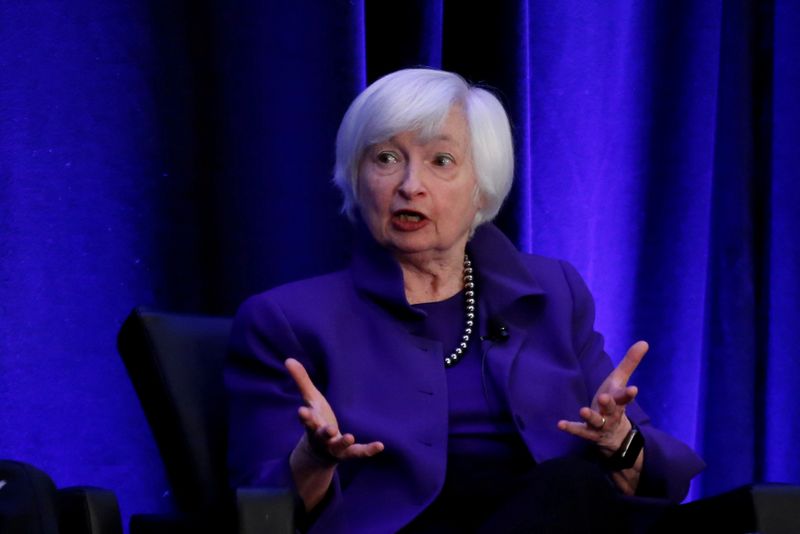By Howard Schneider
WASHINGTON (Reuters) - At U.S. Treasury Secretary-designate Janet Yellen's confirmation hearing Tuesday she nodded to the need for the federal debt to be put on a "sustainable" path, at least eventually.
Her more extensive comments defending President Joe Biden's $1.9 trillion coronavirus spending plan, however, reflected a steady shift in economists' thinking about the mountains of government debt across the developed world that has been underway for a decade and has roots in the near collapse of the euro zone.
Forget about the amount being borrowed, Yellen, a former Federal Reserve chair, told members of the Senate Finance Committee. Focus instead on the interest rate being paid and the returns it will generate, an approach that argues the country's future economic potential can support more borrowing today and makes the roughly $26.9 trillion in U.S. IOUs seem less formidable.
"The interest burden of the debt as a share of (gross domestic product) is no higher now than it was before the financial crisis in 2008, in spite of the fact that our debt has escalated," Yellen said. "To avoid doing what we need to do now to address the pandemic and the economic damage that it is causing would likely leave us in a worse place ... than taking the steps that are necessary and doing that through deficit finance."
Federal government interest payments are now nearly $600 billion annually, but historically low global interest rates have kept them roughly stable as a share of the country's economic output since the 1990s.
That fact will be front and center when Congress debates Biden's spending plan, and in particular will test whether Republicans remain willing to spend more to battle the pandemic now that they've lost control of both the White House and Congress to Democrats.
Coming on top of the more than $3.5 trillion borrowed in large part to fund the coronavirus response last year, "when do we hit the point where the thing starts to collapse? That's what really concerns me and nobody is talking about it really in either party anymore," Senator John Thune, a South Dakota Republican, said at Yellen's hearing.
For a graphic on Can the U.S. "act big" on spending?
https://graphics.reuters.com/USA-ECONOMY/DEBT/xegvbeoqnpq/chart.png
DON'T GO GREEK
In fact, at least among Yellen's economic peers, there has been plenty of talk about the issue since the 2007 to 2009 financial crisis and recession, and the troubles in the euro zone that followed.
When a group of smaller European countries, Greece in particular, ran into trouble repaying their debts in the aftermath of the global financial crisis, the response of larger euro zone members and the International Monetary Fund was to insist those nations make deep cuts to government spending.
Instead of fostering a recovery, that harsh dose of austerity helped drive Greece into an even deeper hole, and in fact made its deficits worse.
In hindsight, the IMF said it got it wrong. After extensive research, Olivier Blanchard, then the IMF's chief economist, eventually concluded government spending can have outsized benefits, particularly in moments of crisis when overall demand for goods and services is weak - as is the case now.
Fast forward a few years. Previously unorthodox ideas, such as Modern Monetary Theory, that see a broader, stabilizing role for government spending began getting more attention, and mainstream economists began to rethink their views about debt in more fundamental ways.
Blanchard, for one, started arguing that when interest rates are lower than an economy's rate of growth - the case in many developed nations - countries shouldn't hold back on well-conceived public investments.
Republican-allied economists like Michael Strain have argued that U.S. levels of borrowing can't be ignored forever, but are a longer-term concern that should not detract from any crisis response. Current Fed Chair Jerome Powell, a deficit hawk when he worked on budget issues at a Washington think tank, has said the same.
Democrats like Jason Furman, who chaired former President Barack Obama's Council of Economic Advisers, have broadened the debate even further to frame the point Yellen made on Tuesday - it is borrowing costs, not debt levels, that matter.

"There's no single metric that summarizes our overall fiscal situation, but one metric I do think is useful to keep in mind is the interest burden," Yellen said. "What we're seeing is that even though the amount of debt relative to the economy is going up, the interest burden hasn't."